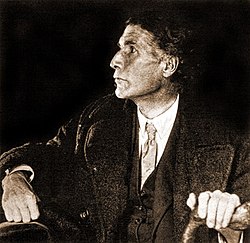
Back جون كوبر باويس Arabic جون كوپير پويس ARZ John Cowper Powys Welsh John Cowper Powys German John Cowper Powys Spanish John Cowper Powys Basque John Cowper Powys Finnish John Cowper Powys French John Cowper Powys Italian John Cowper Powys NB
John Cowper Powys | |
|---|---|
 | |
| Born | John Cowper Powys 8 October 1872 Shirley, Derbyshire, England |
| Died | 17 June 1963 (aged 90) Blaenau Ffestiniog, Wales |
| Occupation | Philosopher, poet, lecturer, novelist, literary critic |
| Alma mater | Corpus Christi College, Cambridge University |
| Period | 1915–1963 |
| Genre | Novel, poetry, philosophy |
| Notable works | Wolf Solent (1929) A Glastonbury Romance (1932) Autobiography (1934) Owen Glendower (1941) Porius (1951) |
| Spouses | Margaret Lyon Phyllis Playter |
John Cowper Powys (/ˈkuːpər ˈpoʊɪs/ KOO-pər POH-iss; 8 October 1872 – 17 June 1963) was an English novelist, philosopher, lecturer, critic and poet born in Shirley, Derbyshire, where his father was vicar of the parish church in 1871–1879.[1] Powys appeared with a volume of verse in 1896 and a first novel in 1915, but gained success only with his novel Wolf Solent in 1929. He has been seen as a successor to Thomas Hardy, and Wolf Solent, A Glastonbury Romance (1932), Weymouth Sands (1934), and Maiden Castle (1936) have been called his Wessex novels. As with Hardy, landscape is important to his works. So is elemental philosophy in his characters' lives.[2] In 1934 he published an autobiography. His itinerant lectures were a success in England and in 1905–1930 in the United States, where he wrote many of his novels and had several first published. He moved to Dorset, England, in 1934 with a US partner, Phyllis Playter. In 1935 they moved to Corwen, Merionethshire, Wales, where he set two novels, and in 1955 to Blaenau Ffestiniog, where he died in 1963.
- ^ Peak District online
- ^ Denis Lane, "The Elemental Image in Wolf Solent", in In the Spirit of Powys: New Essays, ed. Denis Lane. London and Toronto: Associated University Presses, 1990, p. 57; and "Elementalism in John Cowper Powys's Porius". Papers on Language and Literature, 17, no. 4 (1981), pp. 381–404.